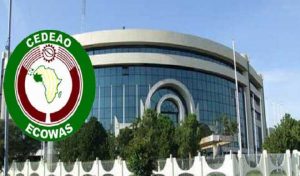Nigerian members of the Parliament of the Economic Community of West African States (ECOWAS) have told the regional legislature that Nigeria has remained stable despite pockets of insecurity incidents ravaging parts of the country.
The delegation, which on Thursday presented Nigeria’s Country Report, through Linda Ikpeazu, at the ongoing Second Ordinary Session of the ECOWAS Parliament in Abuja, stressed that the country’s security forces have largely curbed the activities of terrorists and bandits in the northern parts of the country as well as violent secessionist agitations in the south-eastern part of the country.
“The country has recorded several victories in the fight against insurgency and banditry. On the issue of Boko Haram insurgency, in August 2021, the Nigerian Army recorded millstones in the fight against local terrorism, with at least 186 members of Islamic State In West Africa Province (ISWAP) and Boko Haram surrendering to the Nigerian troops.
“As a result of this unprecedented mass surrender of the terrorists, security incidents in the operating areas of the North East have significantly dwindled.
“Although there have been increased security incidents in the South east states of Nigeria, the region remains stable. These security occurrences are largely as a result of the activities of the proscribed Indigenous People of Biafra (IPOB) group and criminal elements, whose operations wreaked havoc in the region.
“The region has recorded over 200% increase in killings and violent attacks on civilian and government forces since the capture of IPOB leader in June 2021. The leader of the group is currently in custody and being charged for treason,” the report said.
The report also noted that Nigeria has significantly reduced security incidents from the herder-farmer clashes, adding that this positive outcome was reportedly attributed to the anti-open grazing ban that was declared by Governors in the southern states of the country earlier in the year.
In September 2021 the South- South state of Bayelsa confirmed that the enforcement of the anti-open grazing law has effectively restored calmness in the state and has reduced the constant frictions between the herders and other residents in the state,” it stated.
The delegation, however, noted that more needed to be done to completely end the menace of terrorism and insurgency in the country.
The delegation also assured the parliament that Nigeria has made tremendous efforts to vaccinate its citizens against the COVID-19 with available vaccines, which it said has achieved about 98% utilization of the 4 million doses of the Oxford AstraZeneca vaccine.
“As it stands, Nigeria is making concerted efforts to reach ‘herd immunity’ levels. For this to be achieved, we need to vaccinate a total of 80 million eligible persons or 40% of our 200 million populations by the end of 2021. Nigeria also has to vaccinate 140 million persons or 70% of her population by the end of 2022 for immunity to be achieved,” the report added.

Leave a Reply